Sun Yat-sen (1866-1925). Chinese statesman who served as the first provisional president of the Republic of China. Autograph signatures in Western and Chinese script, 14 Evelyn Gardens, S.W., 11 April 1897, the Chinese autograph written vertically between the Western signature and date, minor smudge in loop at head of the capital 'S' in both 'Sun' and 'Sen', neatly inscribed on off-white laid paper stationery with embossed address lettering in black, 1 page, 152 x 101 mm Provenance: From the family of autograph collector Emily Mary Rose Lee (1869-1949), wife of Colonel William Crawford Walton (1864-1937). Emily was the daughter of William Lee Professor of Ecclesiastical History at the University of Glasgow from 1874 to 1886, and granddaughter of John Lee (1779-1859), Principal of Edinburgh University from 1840 to 1859. A rare double autograph of the Chinese statesmen, physician, and political philosopher, who served as the provisional first president of the Republic of China and the first leader of the Kuomintang (Nationalist Party of China). He is called the 'Father of the Nation' in the Republic of China, and the 'Forerunner of the Revolution' in the People's Republic of China. The 150th anniversary of his birth was celebrated on 12 November 2021. Following the First Guangzhou uprising Sun went into exile and raised money for his revolutionary party and to support uprisings in China. While in London in October 1896 Sun was snatched from the street and detained for 12 days at the Chinese Legation, where the Chinese Imperial secret service planned to smuggle him back to China to execute him for his revolutionary actions. He was released through the efforts of the physician and pioneer of first aid James Cantlie, (Sun's former teacher at the Hong Kong College of Medicine for Chinese), who led a media campaign which not only succeeded in releasing Dr Sun, but also made him a hero in Britain. After he was released Sun stayed in London another eight months, spending much of his time voraciously reading at the British Library. By the time he left Britain in June 1897 he was a major revolutionary figure with clear ideas. The movement he inspired was to overthrow the Qing empire in 1911 and appoint Sun 'provisional president' of the Republic of China. The paper used for the autographs would have been the personal stationery of Sir John Furley, CH, CB (1836-1919), an English humanitarian who worked to improve medical care both in wartime and at home. He was an active member of the Red Cross from its foundation, and one of the founders of St John Ambulance Association, set up to promote first aid training. While the connection between Sun and Cantlie is well documented, that between Sun and Furley is unknown. Coincidentally or not, Cantlie and Furley were co-authors/contributors to the St John Ambulance's oft-reprinted work First Aid to the Injured.
Sun Yat-sen (1866-1925). Chinese statesman who served as the first provisional president of the Republic of China. Autograph signatures in Western and Chinese script, 14 Evelyn Gardens, S.W., 11 April 1897, the Chinese autograph written vertically between the Western signature and date, minor smudge in loop at head of the capital 'S' in both 'Sun' and 'Sen', neatly inscribed on off-white laid paper stationery with embossed address lettering in black, 1 page, 152 x 101 mm Provenance: From the family of autograph collector Emily Mary Rose Lee (1869-1949), wife of Colonel William Crawford Walton (1864-1937). Emily was the daughter of William Lee Professor of Ecclesiastical History at the University of Glasgow from 1874 to 1886, and granddaughter of John Lee (1779-1859), Principal of Edinburgh University from 1840 to 1859. A rare double autograph of the Chinese statesmen, physician, and political philosopher, who served as the provisional first president of the Republic of China and the first leader of the Kuomintang (Nationalist Party of China). He is called the 'Father of the Nation' in the Republic of China, and the 'Forerunner of the Revolution' in the People's Republic of China. The 150th anniversary of his birth was celebrated on 12 November 2021. Following the First Guangzhou uprising Sun went into exile and raised money for his revolutionary party and to support uprisings in China. While in London in October 1896 Sun was snatched from the street and detained for 12 days at the Chinese Legation, where the Chinese Imperial secret service planned to smuggle him back to China to execute him for his revolutionary actions. He was released through the efforts of the physician and pioneer of first aid James Cantlie, (Sun's former teacher at the Hong Kong College of Medicine for Chinese), who led a media campaign which not only succeeded in releasing Dr Sun, but also made him a hero in Britain. After he was released Sun stayed in London another eight months, spending much of his time voraciously reading at the British Library. By the time he left Britain in June 1897 he was a major revolutionary figure with clear ideas. The movement he inspired was to overthrow the Qing empire in 1911 and appoint Sun 'provisional president' of the Republic of China. The paper used for the autographs would have been the personal stationery of Sir John Furley, CH, CB (1836-1919), an English humanitarian who worked to improve medical care both in wartime and at home. He was an active member of the Red Cross from its foundation, and one of the founders of St John Ambulance Association, set up to promote first aid training. While the connection between Sun and Cantlie is well documented, that between Sun and Furley is unknown. Coincidentally or not, Cantlie and Furley were co-authors/contributors to the St John Ambulance's oft-reprinted work First Aid to the Injured.


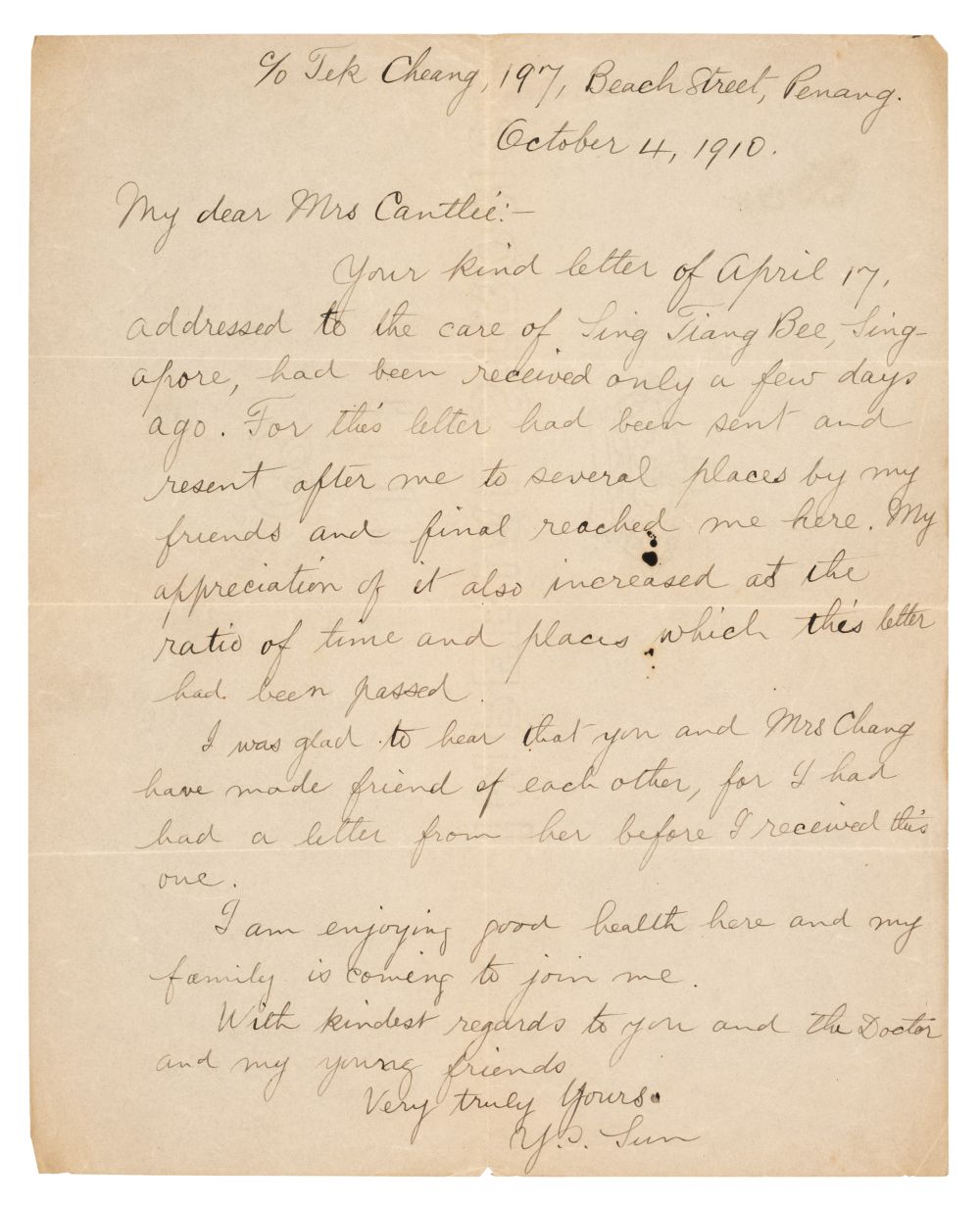
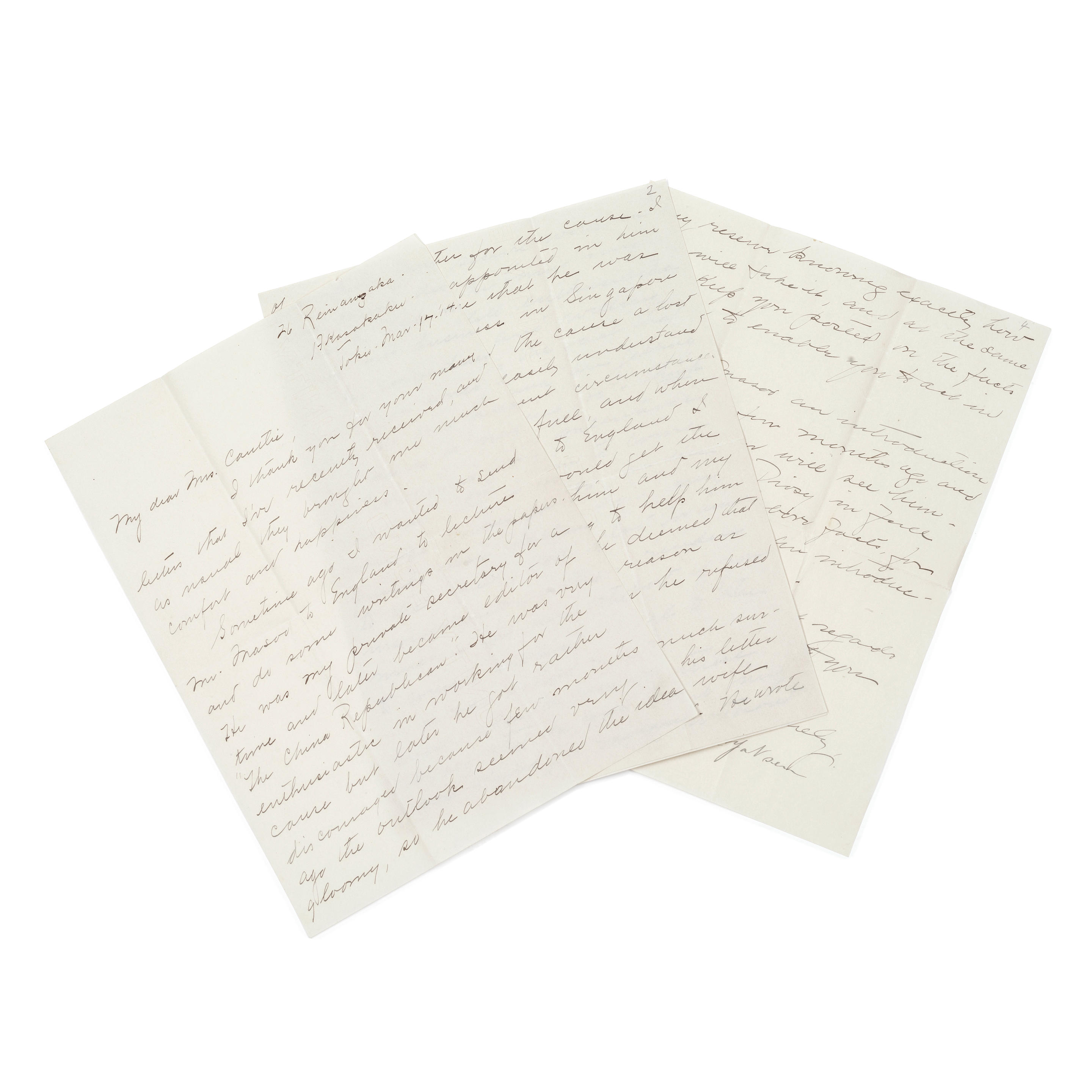


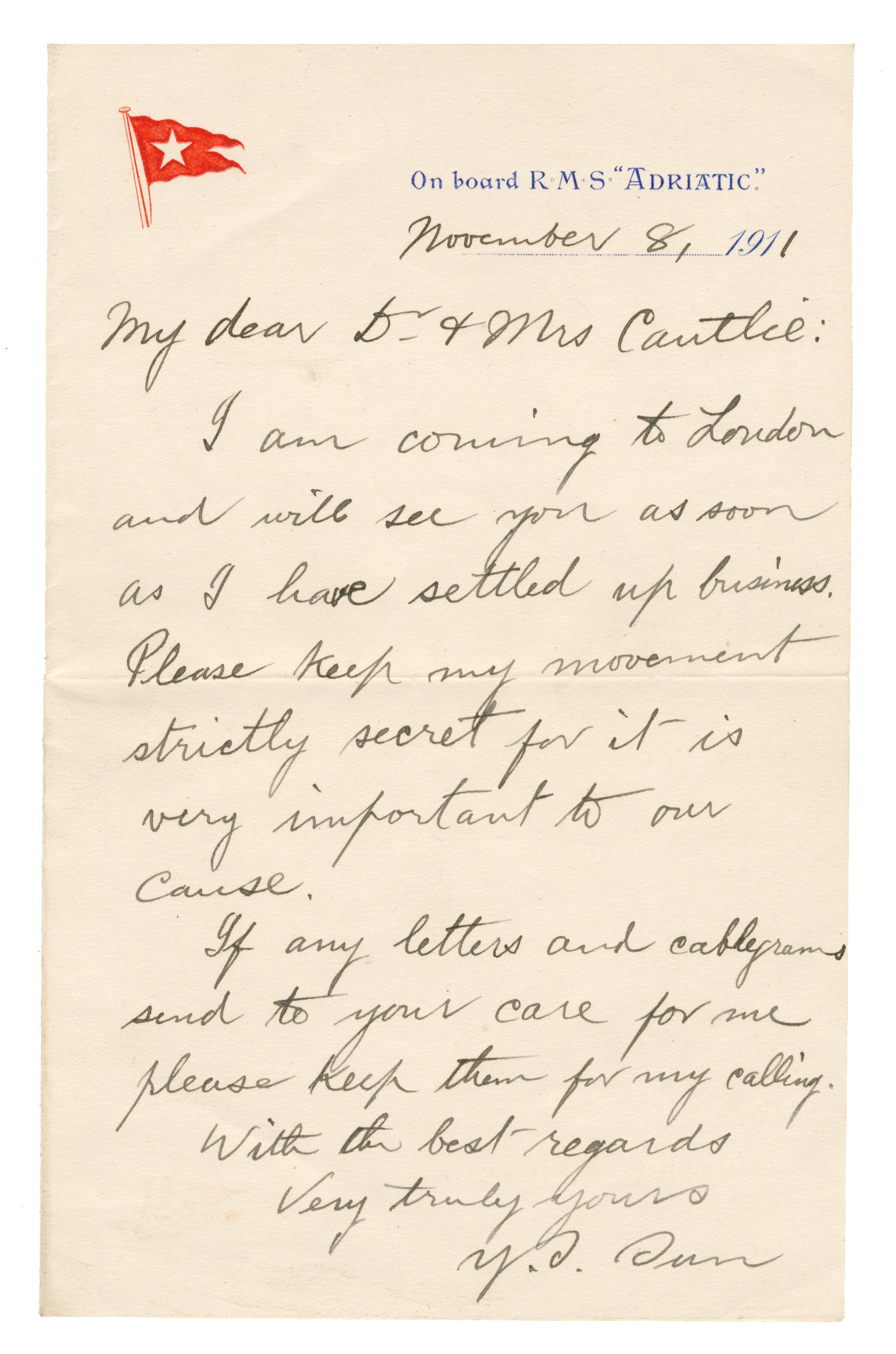
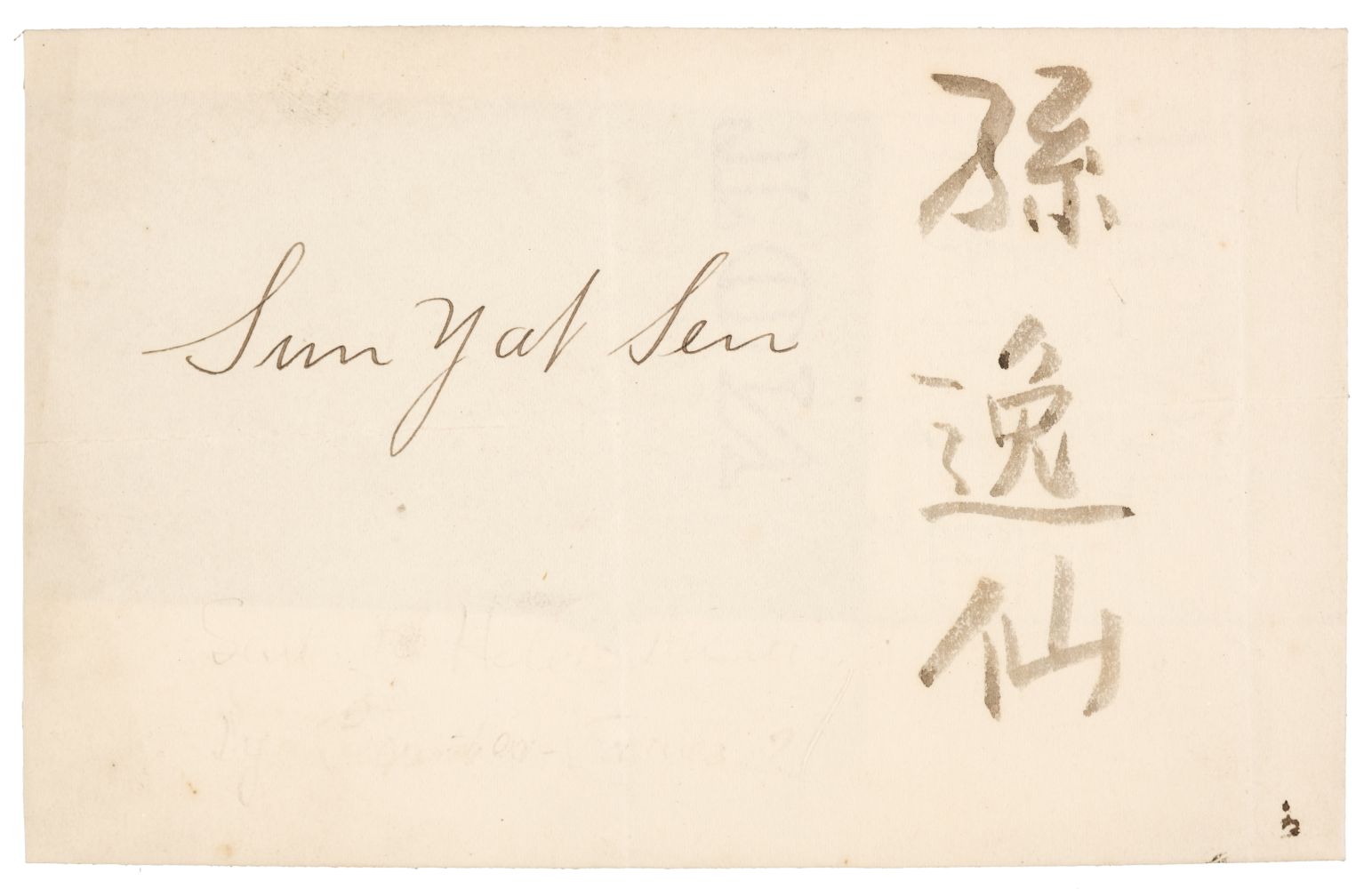
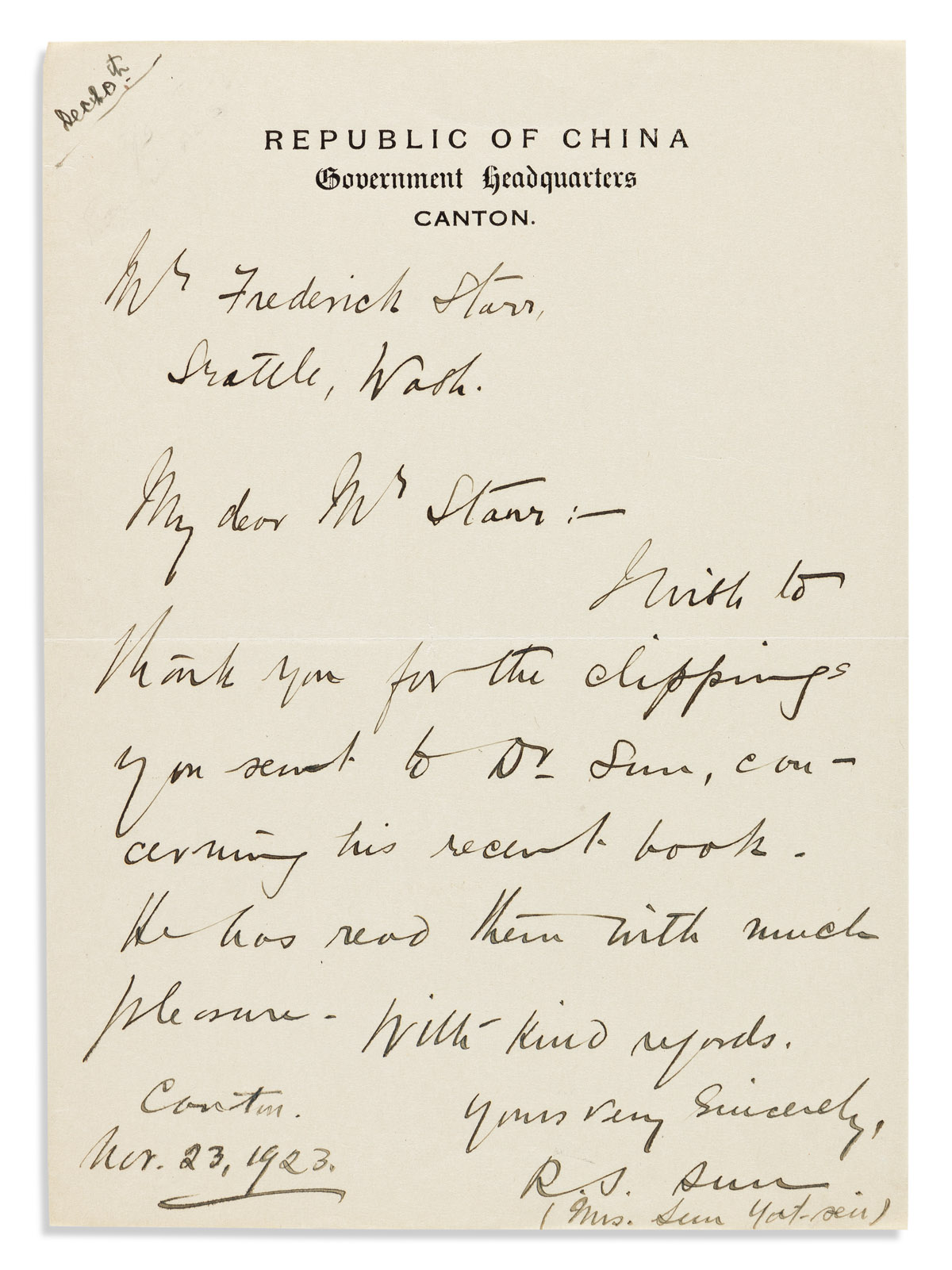

Testen Sie LotSearch und seine Premium-Features 7 Tage - ohne Kosten!
Lassen Sie sich automatisch über neue Objekte in kommenden Auktionen benachrichtigen.
Suchauftrag anlegen